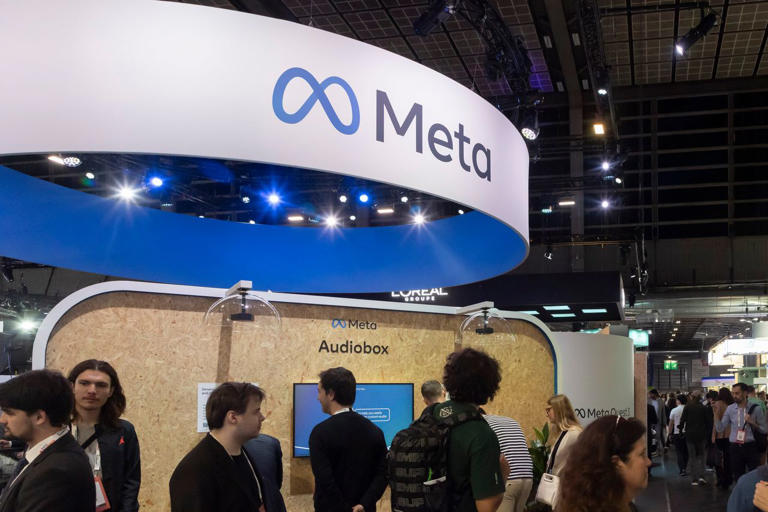Meta Platforms, WhatsApp chatbots, AI integration, business messaging, AI strategy, Mark Zuckerberg, AI chatbots, WhatsApp Business, click-to-message ads, Meta AI, WhatsApp in Brazil, WhatsApp in India, AI in customer service
Meta Platforms is integrating AI chatbots into WhatsApp, aiming to revolutionize business messaging. Explore how this strategic move could transform customer interactions and drive revenue growth. Learn about Meta’s AI-driven features, market focus, and investor reactions.

Meta Platforms, the parent company of Facebook, is embarking on an ambitious venture to integrate free artificial intelligence chatbots into WhatsApp, aiming to transform its messaging apps into significant business units. This strategic move is part of CEO Mark Zuckerberg’s broader vision to embed AI across Meta’s platforms, seeking to eventually monetize these applications.
AI Integration: A Strategic Shift
The introduction of AI-powered chatbots on WhatsApp represents an early-stage experiment in Zuckerberg’s plan to leverage AI for business growth. Unlike its competitors, Meta’s approach involves providing both its AI model and chatbots free of charge. This distinctive strategy aims to attract businesses to use WhatsApp as a primary tool for customer interaction, potentially leading to increased adoption and revenue generation.
However, this strategy has not yet received widespread investor approval. Concerns persist, particularly as Meta’s AI-related expenditures continue to escalate. In its latest quarterly earnings report, Meta indicated that its spending on AI infrastructure could rise by up to $10 billion in 2024. This announcement led to a 10% drop in the company’s stock price, highlighting investor apprehension about the substantial investments without immediate returns.
Expanding Business Use Cases
Meta’s focus on business applications for WhatsApp, particularly in markets like Brazil and India, has demonstrated unexpected progress in monetizing messaging apps. Traditionally, Meta has charged businesses for using the WhatsApp Business Platform, enabling them to communicate with customers directly through the app. Additionally, Meta has expanded its click-to-message ads, which appear on Facebook and Instagram and initiate conversations between users and businesses on WhatsApp and Messenger.
In 2023, click-to-message ads generated $10 billion in annual sales. By April 2023, Meta reported that its Family of Apps other revenue, driven primarily by WhatsApp Business Platform, reached $380 million for the quarter. Although these figures constitute a small fraction of Meta’s total $133 billion revenue for 2023, they illustrate the potential for growth in this segment.
New AI-Driven Features
At its Conversations event in São Paulo, Meta unveiled several new features driven by AI, further outlining its strategy to enhance business interactions on WhatsApp. One of the key announcements was the expansion of AI chatbots for businesses, designed to manage the large volume of customer interactions efficiently. Starting next month, Meta will launch its Meta AI chatbot in Portuguese, marking its first language expansion beyond English. Brazil, being one of WhatsApp’s largest markets, underscores the significance of this move.
Additionally, Meta plans to enable users of its WhatsApp Business app to utilize AI for ad creation. By offering AI-powered ad-creation tools for free, Meta aims to empower businesses, particularly smaller ones, to create ads and subsequently pay Meta to promote them. This approach seeks to democratize ad creation, potentially increasing the number of businesses advertising on Meta’s platforms.
Competing in the AI Race
Meta’s foray into AI accelerated following the launch of ChatGPT by OpenAI in late 2022. Since then, Meta has introduced Llama 2, a large language model, and its Meta AI chatbot. Both were updated in April, reflecting Meta’s commitment to advancing its AI capabilities.
Zuckerberg has consistently advocated for patience among shareholders, drawing parallels to past successful transitions, such as the shift to mobile advertising and the introduction of Reels to compete with TikTok. However, investor confidence has been tested, especially since the company’s rebranding and significant investments in the metaverse. Meta’s Reality Labs division has spent nearly $60 billion on initiatives aimed at developing virtual reality and augmented reality technologies, including VR goggles and smart glasses.
Investor Sentiment and Future Prospects
Investor skepticism remains a challenge for Meta, particularly given the substantial financial commitments to AI and the metaverse. Bernstein analyst Mark Shmulik highlights the importance of demonstrating tangible progress to investors, suggesting that an AI-powered chatbot for business messaging might achieve product-market fit more swiftly than other ambitious projects like smart glasses.
Meta’s AI strategy, centered on free and accessible AI tools for businesses, positions the company uniquely in the competitive landscape. By focusing on practical applications of AI in customer relations and advertising, Meta seeks to build a robust business model around its messaging apps. This approach could potentially yield significant returns if successfully implemented, ultimately justifying the hefty investments in AI infrastructure.
In conclusion, Meta’s initiative to integrate AI chatbots into WhatsApp signifies a pivotal step in its broader AI strategy. By leveraging AI to enhance business interactions and democratize ad creation, Meta aims to transform its messaging apps into viable business units. While investor confidence remains tentative, the success of this strategy could redefine Meta’s business landscape, aligning with Zuckerberg’s long-term vision of an AI-driven future.
Read More-